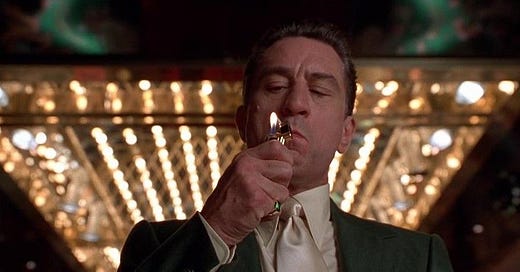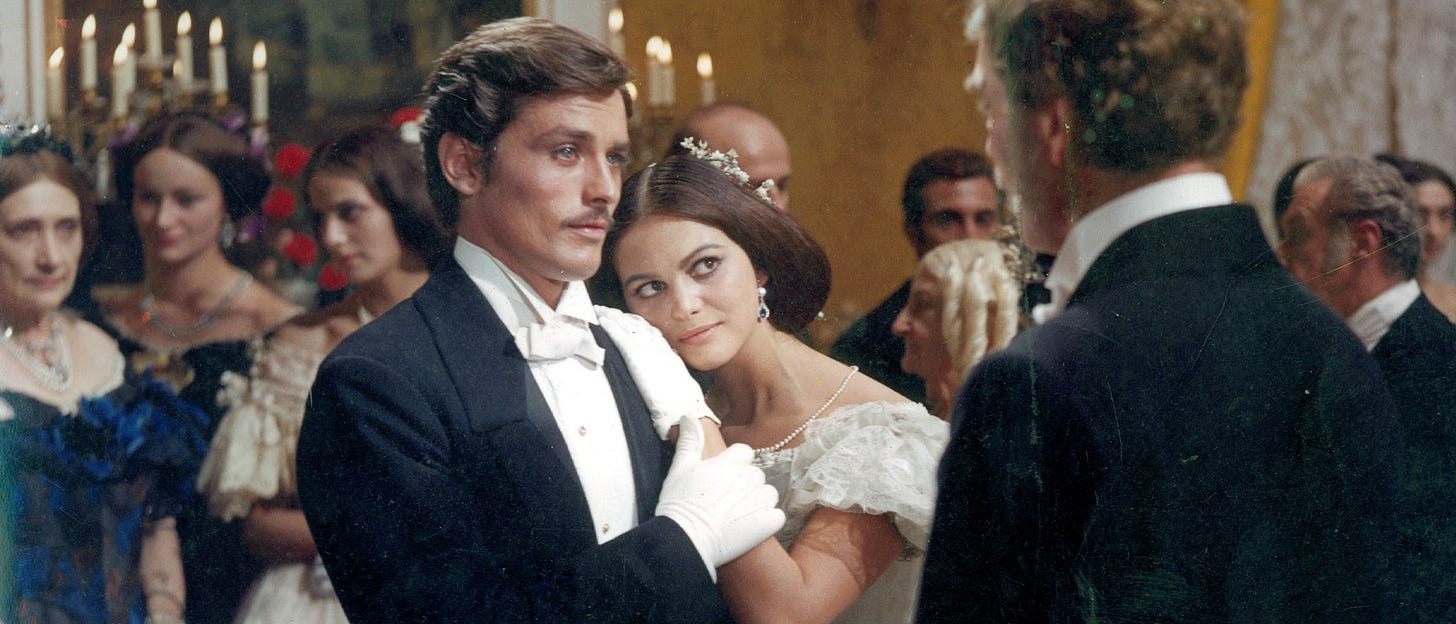This month, I watched Casino (1995), aka: Goodfellas (1990) but make it Vegas, and The Leopard (1963), a dubbed Italian film featuring French sex god actor Alain Delon and American screen legend Burt Lancaster.
Let’s get into it:
Casino (1995, dir. Martin Scorsese) — The thing about me is that, like most insufferable film bros, I love a collaboration between Martin Scorsese and Robert De Niro (see: Taxi Driver (1976), Raging Bull (1980), Goodfellas (1990), Killers of the Flower Moon (2023), etc.).
Casino fictionalizes Casino: Love and Honor in Las Vegas (1995) by Nicholas Pileggi, aka: the author of Wiseguy (1985), aka: the book that inspired Goodfellas (1990). With a script penned by Pileggi and Scorsese, the film takes the real-life story of Mafia associate, sports better, and professional gambler Frank Lawrence “Lefty” Rosenthal and recasts him as Sam “Ace” Rothstein (played by De Niro), while high-ranking Chicago mobster Tony Spilotro and showgirl Geri McGee become Nicky Santoro (played by Joe Pesci) and Ginger McKenna (played by Sharon Stone). As Ace navigates life as a Jewish casino owner in the Mafia-laden world of 1970s and 1980s Las Vegas, the line between friends and enemies begins to blur.
In both Goodfellas and Casino, friends that feel like family become enemies, and glamour belies grit. In a review for The Ringer, Adam Nayman notes how “long, clean dramatic lines of a tragedy and…slapstick humor” propel both films. But Casino adopts a distinctive tone compared to its predecessor, a quieter one that Nayman considers in that same review. He writes: “Goodfellas plays as a parody of a coming-of-age movie, with Henry simultaneously moving up the ranks and descending into a moral void; the key to [Ray] Liotta’s performance is that he plays him at all times like a callow, overgrown kid. Casino’s protagonist, though, is a grown-up. Ace is already middle-aged when the story begins in 1973, and he ages visibly through the narrative…With the earlier film, it’s as if Scorsese was trying for a show of youthful force…Casino has a few bravura set pieces and its own brand of filmmaking excitement…and yet the showmanship is judicious. The sensibility here is less exuberant than rueful, and carefully attuned to institutional systems of grift.”
I would argue that, where Goodfellas functions as Scorsese’s spin on a coming-of-age story, Casino, at its core, operates as a meditation on marriage through the prism of extreme circumstances. As the film opens, Ace, approaching his car, narrates: “When you love someone, you've gotta trust them. There's no other way. You've got to give them the key to everything that's yours. Otherwise, what's the point? And for a while, I believed, that's the kind of love I had.” He turns it on. A bomb goes off, his body seemingly subsumed by the explosion, before the film flashes back to 1973, and its elliptical narrative begins.
This opening reflection provides immediate insight into Ace’s moral code, a set of principles at odds with Ginger’s values. Early on in the movie, Ace proposes to Ginger, prompting a frank discussion about his love for her — and her lack of love for him. He seems at peace with her absence of feeling, confident in its potential to develop with time so long as trust and mutual respect remain in place. Meanwhile, Ginger — a crystalline embodiment of unchecked borderline personality disorder, brought to life brilliantly by Stone — prioritizes her own survival above all else. As the narrative progresses, this moral fissure widens and places Ace on a path toward destruction.
In his 1995 review, Roger Ebert writes: “She [Ginger] marries him. It is Ace's first mistake. Another mistake was to meet Nicky Santoro (Joe Pesci) when they were both kids in Chicago.” In Goodfellas, Henry spirals into a state of addiction, coalescing in the iconic coke-laden helicopter chase scene (one of my all-time favorites). Meanwhile, in Casino, Ace’s downfall stems not from a personal vice, his gift for gambling, but rather his questionable ability to judge character. Where Henry stays tightly attuned to shifting alliances, Ace blindly believes in trust as an activated omnipresent principle, especially within the confines of marriage. This naïveté leaves him beholden to an ignorantly-appointed inner circle, left with no one to break his fall.
Where to Watch: Peacock (subscription), Amazon Prime Video ($3.79)
The Leopard (1963, dir. Luchino Visconti) — I feel obliged to first point out that this movie, to me, feels incredibly long. Like really long. I’d still recommend seeing it, but maybe on your couch with pausing points instead of in a theater. In advance of attending a 12:45 PM screening at Film Forum, I had read that its denouement comes in the form of a 45-minute ball sequence. When it began at 3:05 PM, I was in actual shock. Both the U.S. and European cuts ironically have shorter run times than Casino, but something about Scorsese’s pacing keeps his body of work feeling frenetic no matter the length. But I digress.
A period piece, The Leopard captures a moment of sociopolitical change in 1860s Sicily. Per Warfare History Network (lol): “In the spring of 1860, when Giuseppe Garibaldi became Dictator of Sicily, Italy was a confusing conglomerate of states, divided between Piedmont-Sardinia and Austrian Venetia in the north, the Papal States in the middle, and the Kingdom of the Two Sicilies, centered in Naples, in the south. Compared to the rest of Italy, the Neapolitan realm was politically and economically backward and its new king, Francis II, was borderline incompetent. Fearing that conditions could spark a return to the revolutionary fervor of the late 1840s, European leaders pushed Francis to enact political reform, but the obstinate king refused. He was committed to promoting his own absolute power, even at the cost of provoking increased hostility from his own people. Revolts in Naples that April were forcibly suppressed, increasing resistance to Francis at home and abroad.” Don Frabrizio, Prince of Salina (played by Burt Lancaster), finds himself contemplating the end of an era amidst this landscape as his nephew, Tancredi (played by Alain Delon), fights alongside Garibaldi’s redshirts.
The cinematography, costumes, and sets stun from start to finish, but the final ball scene serves as the film’s crown jewel. Per Film Forum, critic David Thompson notes: “If you want to know how the Sicilian aristocracy dressed and had dinner in the 1860s, this is the film for you – and I do not mean that facetiously. For what is most remarkable about The Leopard is that the film’s eye for table settings, porcelain, the color of the wines, and the costume of the ladies is only as strict and admiring as that of the film’s central character, Don Frabrizio, Prince of Salina, the monarch of the melancholy.” Lancaster gives a stunning, sorrowful performance as the Prince, who stands in stark contrast to his nephew’s vitality. As he dances with Tancredi’s fiancé, “daughter-of-the-people” Angelica (played by my girl Claudia Cardinale, whose hair and makeup serve 24/8), at the ball, a flash of hope, of desire, surges. But ultimately, recognition of his mortality reigns supreme. The Prince wanders through the party, then the streets, in isolation, emblematic of the passing of the old guard.
As an aside: I spent most of my screening shocked that Burt Lancaster, famously an American actor, spoke Italian so fluently before learning from my post-movie Wikipedia rabbit hole that the film was, indeed, dubbed in Italian after the fact.
Where to Watch: Amazon Prime Video ($3.99)
Stay tuned for the May newsletter tomorrow!
xo,
Najet







